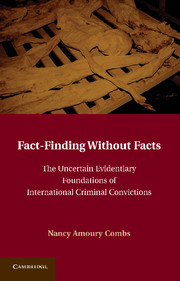 Fact-Finding without Facts
Fact-Finding without Facts Book contents
- Frontmatter
- Contents
- Acknowledgments
- Introduction
- 1 The Evidence Supporting International Criminal Convictions
- 2 Questions Unanswered: International Witnesses and the Information Unconveyed
- 3 The Educational, Linguistic, and Cultural Impediments to Accurate Fact-Finding at the International Tribunals
- 4 Of Inconsistencies and Their Explanations
- 5 Perjury: The Counternarrative
- 6 Expectations Unfulfilled: The Consequences of the Fact-Finding Impediments
- 7 Casual Indifference: The Trial Chambers' Treatment of Testimonial Deficiencies
- 8 Organizational Liability Revived: The Pro-Conviction Bias Explained
- 9 Help Needed: Practical Suggestions and Procedural Reforms to Improve Fact-Finding Accuracy
- 10 Assessing the Status Quo: They Are Not Doing What They Say They Are Doing, but Is What They Are Doing Worth Doing?
- Conclusion
- Bibliography
- Index
- References
9 - Help Needed: Practical Suggestions and Procedural Reforms to Improve Fact-Finding Accuracy
Published online by Cambridge University Press: 05 October 2010
- Frontmatter
- Contents
- Acknowledgments
- Introduction
- 1 The Evidence Supporting International Criminal Convictions
- 2 Questions Unanswered: International Witnesses and the Information Unconveyed
- 3 The Educational, Linguistic, and Cultural Impediments to Accurate Fact-Finding at the International Tribunals
- 4 Of Inconsistencies and Their Explanations
- 5 Perjury: The Counternarrative
- 6 Expectations Unfulfilled: The Consequences of the Fact-Finding Impediments
- 7 Casual Indifference: The Trial Chambers' Treatment of Testimonial Deficiencies
- 8 Organizational Liability Revived: The Pro-Conviction Bias Explained
- 9 Help Needed: Practical Suggestions and Procedural Reforms to Improve Fact-Finding Accuracy
- 10 Assessing the Status Quo: They Are Not Doing What They Say They Are Doing, but Is What They Are Doing Worth Doing?
- Conclusion
- Bibliography
- Index
- References
Summary
The foregoing chapters have sought to analyze and explain international criminal fact-finding as it is carried out by the ICTR, SCSL, and Special Panels. That analysis and explanation give rise to a series of normative questions, which I consider in this chapter and the next. This chapter explores various reforms that might be undertaken to improve the accuracy of international criminal fact-finding. Now that we know what sort of fact-finding impediments exist at the international tribunals, we can consider proposals to ameliorate the effects of those impediments. Section 9.A begins that discussion by considering various adaptations to the pretrial, trial, and posttrial processes that currently exist at the international tribunals. Section 9.B explores more radical reforms; it considers whether international trial procedures should be fundamentally reformulated, as a means of enhancing fact-finding accuracy. Before launching into my suggestions for improvement, I wish to frame them with the recognition that the evidentiary problems that I have heretofore identified permit no easy resolution. Western criminal procedures presuppose the existence of witnesses who are willing and able to convey – in a way understandable to the fact-finder – certain information about the events that they have witnessed. To the extent that witnesses are unwilling or unable to perform these tasks, factual accuracy will suffer. How much factual accuracy will suffer is, I believe, influenced to some degree by the criminal procedures that I discuss in the following pages, but the problems I have identified are sufficiently severe, pervasive, and intractable that no combination of reforms is likely to entirely eliminate their distortive effect.
- Type
- Chapter
- Information
- Fact-Finding without FactsThe Uncertain Evidentiary Foundations of International Criminal Convictions, pp. 273 - 333Publisher: Cambridge University PressPrint publication year: 2010


